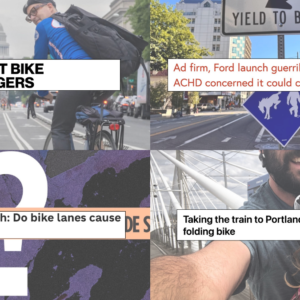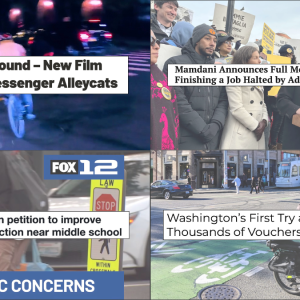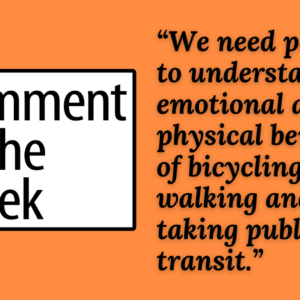
[Publisher’s note: This is the first in a three-part story on Portland’s bike messengers by new contributor Erin Greeson.
When her friend Zak Kovalcik crashed and broke his collarbone last fall, Greeson came face-to-face with the tough reality faced by Portland’s bike delivery professionals. In this in-depth, three-part series, Greeson shares how the deck is stacked against messengers and how they are trying to survive in a challenging profession.]
“The paradigm of the typical messenger service business model is problematic. It’s a pyramid-shaped scheme where the workers are on the bottom.”
–Ira Ryan, former messenger
As Portland’s reputation as a green business boomtown gains momentum, bike-centric ventures emerge as quickly and viably as organic brewpubs and cafes. While a new era of entrepreneurs seeks to capitalize on this evolving economy, one of the oldest bike-based businesses, bicycle messenger services, faces challenges that impact workers and business owners alike.
While the number of inner city cyclists skyrockets, messengers might seem unmistakable amidst the sea of spandex and commuters. However, volumes of fixed-gear fans and track bike hobbyists strive to adopt a messenger-type “look,” so it takes some observation — and better yet, dialogue — to identify working messengers.

Once you get to know these human-powered couriers, you realize their job is demanding on many levels, and that pedaling fast is actually the easiest part.
To get a feel for the nature of their work, I talked with several experienced messengers. I began with Ira Ryan, who is renowned for his signature hand-built bicycles but previously worked as a messenger. During his time as a courier, Ryan found that working conditions were plagued with inherent problems.
“The paradigm of the typical messenger service business model is problematic,” Ryan said. “It is a pyramid-shaped scheme where the workers are on the bottom.”
Ryan explained that messengers are often paid solely on commission; they generally do not enjoy staples that other service industry workers receive, such as hourly pay, worker’s compensation and group health plan buy-in options. Ryan added that the commission-based structure of the business makes it hard for individuals to organize. “The conditions of bike messenger work make it difficult for workers to band together,” he said, “It can be challenging to empathize with the person next to you, because there’s incentive to outwork each other.” In later years, Ryan took significant steps to reject and evolve the faulty system that he described.
Longtime messenger Dee Branham, who has over 13 years of experience in Dallas and Portland, shared similar sentiments. “Bike messengers get a raw deal at every level: the injuries, the low pay, the lack of health insurance,” he said, listing a few core issues. “Plus, fuel cost rate increases put more money in (courier) companies’ pockets without increasing messengers’ pay rates,” Branham added.
Joel Metz expanded on the problematic issues of compensation rates. “Messenger service rates stagnated from the ‘80s through the mid-‘90s,” said Metz, whose impressive 14 years of experience include work in San Francisco, Toronto, London and Portland. “They will likely never be what they ought to be.”

The danger-to-compensation ratio of bike messenger work starkly contrasts with that of other jobs that require constant exposure to hazardous elements. For example, construction workers typically receive relatively higher pay rates and are protected by workman’s compensation laws, if employed by law-abiding companies. Food and beverage service workers in Oregon are granted an hourly wage by law, plus workman’s compensation protection and – in some cases – options to purchase into group health plans. Despite the injury-rich nature of their work, bike messengers typically do not.
“In recent years, the cost of workman’s compensation coverage for bike messengers ranked second highest of all categories.”
— Hazel Gross, bike messenger
Branham explained that the likelihood of injury for bike messengers is virtually inevitable. “It’s not just about the cars,” he said, explaining that — in addition to the risk of collision — constant lifting and repetitive load bearing cause chronic back, neck and shoulder injuries for most messengers.
As I grasped to understand how such a flawed business model could sustain itself in Portland, messengers explained that business owners typically hire couriers as independent contractors. Many messenger business owners cannot or will not face the high cost of workman’s compensation coverage for bike messenger employees, so they often avoid the expense by signing on contractors.
“In recent years, the cost of workman’s compensation coverage for bike messengers ranked second highest of all categories,” said Hazel Gross, an outspoken and experienced member of the community. “Some messenger businesses were faced with a choice: either fire some messengers to afford workman’s comp coverage, or go without it.”
— In the Part Two of this series (read it here), we’ll learn more about health insurance and another challenge for messengers — overcoming stereotypes.








Thanks for reading.
BikePortland has served this community with independent community journalism since 2005. We rely on subscriptions from readers like you to survive. Your financial support is vital in keeping this valuable resource alive and well.
Please subscribe today to strengthen and expand our work.
However, volumes of fixed-gear fans and track bike hobbyists strive to adopt a messenger-type “look,” so it takes some observation — and better yet, dialogue — to identify working messengers.
Might I suggest you look at your closest and dirtiest watering hole to find a few.
Yeah, or the methadone clinics, or punk shows, or the free box, or the food bank. Stereotypes are foolish.
Wow Mike B.
Hope that was a joke.
“A pyramid-shaped scheme where the workers are on the bottom.” Ummm what’s new, that is how it works in this country. I’d argue that this would be the same model in any democratic capitalist society. I have no problem what so ever being one of the workers at the bottom so to speak. I don’t have to make decisions, I’m told what to do and I get paid every two weeks. Interesting comment, really any business under the sun has a top to bottom approach.
Humm. Yet another argument for nationalized healthcare.
this may be a stupid suggestion…
But maybe the messengers should start a coop messenger service, pitch it to companies and agencies etc as like “fare-wage messengering service”.
Maybe a group could put the other cats out of business…
Forgive me if it sounds stupid.
I meant: “fair-wage messengering service”.
Destin: Excellent thinking. You will enjoy the next installments of this report, because they 1) address how some messengers have taken matters into their own hands to improve conditions and 2) they encourage the precise kind of entrepreneurial thinking that you suggest above. Thanks for such great ideas!
That is fantastic news Erin!
Looking forward to the next bits of the story.
The problem with “fair-wage messengering service” is much like the problem with fair-wage coffee, or grocery stores, or whatever. It is great to go into New Seasons and know that the employees working there are getting paid enough and that the food is [moreso than average] sustainably grown and etc, but the prices show it. Since it is food, and food is important to me, I’m willing to pay more, however, many people will not.
The same thing applies to the average company looking to hire a messaging service, if the prices are higher, and those prices aren’t worth something to their customers, (when you buy a house, and pay the courier fee, do you really think, “next time I buy a house, I’ll use the closing company that hires fair wages couriers,” or do you think, “form 50 of 200 that I need to sign today,”?) then it just doesn’t make them money…
Hey Mathew,
My impression would be that the messengers have a cooperative, actively run the business.
So in the current model, the owners are taking the profit and the messengers are not. If that was redistributed, ie the messengers owned, dispatched, and delivered, the could disperse the profits evenly and create an group employee health plan.
So in theory the end client would see no appreciable difference in cost.
I am sure it is considerably more complicated than how i am broadly painting it, but i do not think it would need to be more expensive.
Cheers
sorry about all the wonky grammar etc, typing form a mobile device.
Breathing fumes from idling vehicles and vehicle exhaust appears to be the greatest health risk for Bike Messengers. I was downtown today and walked by 2 big rigs that were idling for no apparent reason. Does Portland have a no idling policy?
Matthew, I want to see the salary that the owner of the company gives himself before I accept that argument.
Also, I would say that if you can’t afford to treat your employees decently, then you can’t afford those employees. That attitude might cause messenger companies to go out of business, in which case either the prices would go up, the services would disappear or messengers would become independent contractors. I don’t know all the ins and outs but I don’t think it’s acceptable to say you can’t afford to pay a living wage. A living wage should include access to healthcare, a place to live, transportation and food.
UPS hired temporary bike “messengers” over the holiday season. I wonder how their pay and benefits compared to the average full-time messenger? Probably better, if not significantly better, despite the temporary nature of the work. Would be fantistic if a delivery company saw the benefit of a full-time bike messenger fleet. From the sound of it, there were significant cost savings to UPS compared to doing the same deliveries via truck. But who knows if all operating and overhead costs were fairly allocated in the comparison.
It all boils down to the “health-care” industry being the puppet masters of the economy.
The “service” they provide is inanely over-priced and should definitely be taken away from them and be socialized like many other similar social services (law enforcement, fire departments, military, education, postal services, etc…).
Most small/innovative/efficient/smart/important/healthy companies can not afford to pay a living wage AND provide acceptable health-care benefits to their workers. That is a reality. We need to change the paradigm.
Bike messengers are cool. When I moved to Portland in ’91 I wanted to be a bike messenger. Tons of street cred!
I was willing to work for peanuts, and they didn’t even offer me a job. I would have taken anything.
I can’t help thinking that this affects wages. And I have no idea of any cure.
I’m no messenger. When I was young I worked as a bike mechanic. I worked my ass off. Wages were low, no health care, vacation, sick leave, retirement, cell phone plans, company sponsered health clubs…just minimum wage. Eight years in the bike business and by then I had a wife and two kids. “Living Wage” was a joke. I’m 46 now. After my bike shop years I had to get a job to support my family. So I worked at Boeing here in Seattle for 18 years. I saved my money. I raised my Four kids. Two have graduated college…one a Senior in HS, one a Freshman. I quit Boeing two years ago. I started my own bike shop four years ago…worked both jobs for two years. I pay through the nose for health care. But I’m doing it. I guess what I’m getting at is that if you want a job that pays well and has good benifits, get a job that has them. There is no romance in building wings at Boeing. But I did it for 18 years. I consider it a fancy job to work at a bike shop, or as a messenger. No disrespect. But really, If it paid well, everyone would be doing it. You can’t have it all. I hated Boeing. But it paid for what I needed. I put up with a lot of crap in that 18 years. But now I’m back doing what I love…on my terms. I object to entitlement. Try running your own business and see how easy it is???
Not to get ahead of the series, but the quotes I’ve seen for workman’s comp rates for bicycle messengers is on the order of $10k/employee/year. I would assume that the owner isn’t making that much profit, (is the owner of a 10 person company taking home more than $100k/year, on top of the wages for the work that they do?) If they are, then someone would have started a messenger company, lowered his/her rates below their competitors, (so they were only taking home $5k/year/employee, for instance,) and cornered the market, (at least until someone decided to do it for $1k/year/employee, and they went out of business too.) A cooperative doesn’t have to get workers compensation for the owners, but that doesn’t change the fact that when the messengers get hurt, (and they do, which is why they want workers compensation in the first place,) they don’t have insurance… Not that a cooperative can’t do better for it’s employees than a normal company, but I suspect that the profit margins are just not high enough be paying bicycle messengers a living wage+health care+retirement+etc, the money just isn’t there.
The real solution is some combination of living wage laws, health and safety laws, (maybe like a law that requires companies to buy workers comp, (I mean, a law that doesn’t have a loophole big enough to get a messenger though,)) and/or a union, (how do you keep people like Fergus #18 from undercutting the union laborers?)
Uh, you don’t. that’s why unionization would never work in a town as small as portland.
Also, if this series is going to be about the (current) exploitation of bike messengers, you might want to interview people who are currently being exploited. Ira, Joel and Dee all work/worked for Magpie, a collective, and Hazel ran her own company before retiring (?).
Unionize it. I don’t think the Fergus’ in this city would have the cojones to cross a bike messenger picket line.
Yes Unionize it!
I’m sure people would be more than willing to have their packages delivered for 125 dollars per package!
Lets say the average messenger makes 70 dollars per hour after benefits like the average GM worker for example. How much would it cost to deliver your package?
Wages are low because…….
#1. People want to be bike messengers.
#2. Its not a job that requires much technical skill or education.
#3. There is a ceiling to how much people will pay to have something delivered.
#4. Faxes, email etc have all made much of this unnecessary.
outlaw7x77 #19:
a “fancy job”? do you call postal workers, ups drivers, and fedex drivers the same? cause in the end, i fail to see the difference. ask the lawyers, accountants, architects, etc who depend on my services just how frivolous they think they are.
am i to infer from your posting that the jobs we love are for our youth and older years, when we can “afford” to risk enjoying them, and the money-making jobs we hate are the “real” jobs, and we should all just suck it up or risk being mistaken for having an inflated sense of entitlement simply for believing that one ought to be able to do work they love AND make a living at it?
its a romantic notion, i know, but when you work at what is arguably one of the more dangerous jobs out there, i dont think it is entitlement to think that perhaps you might get paid at a rate better than your average fast-food worker.
ive got more responses to comments than i can shake a stick at right now, but i have to leave for work soon – nevermind that erin has several more parts of this article coming, which deal with some of those responses.
>>”A pyramid-shaped scheme where the workers are on the bottom.” …Interesting comment, really any business under the sun has a top to bottom approach.”<<
Except for worker-owned cooperatives. For example, Citybikes Workers’ Cooperative has been working under such a business model successfully for almost twenty years. There is no boss in this business model; instead, workers make decisions collectively and share responsibility in running the business — and share the profits when they are to be earned.
Magpie is not the only messenger collective out there, but it takes hard work, maturity and patience to run a business collectively; that could be why the number of worker collectives remains fairly small in an otherwise “Big Parent” business economy.
If you remove the roughly 30% of the price of health care that goes to the ‘product development’ folks who get paid to dream up fancy ways to deny policy holders care, workmans comp wouldn’t be 10k a year for workers.
But then if people didn’t have to worry about where their next meal was coming from they might start agitating for real change in this country.
fergus (#18) nailed it.
FYI: I just published Part Two of this series.
Bottom Line: I’ve come to expect a higher level of journalism from bikeportland–more current sources, more advanced thinking, and so on. I’ll be skipping the two followups. Sorry Jonathan, but I’ve come to regard you as a real news source. And you usually do not disappoint.
Robert #24. You fax/email argument tells all that’s necessary about your experience with the messenger world. Nice of you to add the part about messengers not having technical skills. Where did you discover that nugget, during your messenger career? I think not. Please refrain from generalizations about a group you know nothing about. Messengers are generally a well educated group of people who do a necessary job because they enjoy the autonomy the job offers. This doesn’t exempt them from wanting to better certain aspects of that job, ie access to affordable healthcare, a living wage, etc. How do I know this? Because I did this job for 5 years and I know people all over the world who do this job. Do you? Or did you learn all about us watching the SF Real World?
GREAT ARTICLE!
Hi A Regular Reader,
I hear you, and I am glad that your expectations of this site are so high.
I wish you weren’t disappointed in this story, but thanks for sharing your opinion.
A story can always be better. There are always other perspectives we can seek out and present.
I think Ms. Greeson did an awesome job with this story… and she did it as someone who cared about the issue and wanted to share more about it.
I’m not sure what you mean about “current sources”… I think all the messengers in the story are more than credible.
If you have other ideas for future messenger-related stories, please let me know and we’ll consider some addditional coverage.
email me any time with your feedback jonathan[at]bikeportland[dot]org.
thanks.
I will start my own segway messengering service to rival bicycles. What do you think about this? Not as injury prone and I will hire a bunch of day laborers to keep costs down, this would destroy messengering in Portland at least.
I am somewhat concerned about the section that claims that messengers are not covered under work comp laws. I work as a legal assistant at a work comp law firm here in Portland, as far as I understand the law, ALL EMPLOYERS need to have work comp insurance. Its kinda like how you have carry liability insurance for your car if you drive. I can’t see how any messenger, hurt while performing their regular duties, wouldn’t be covered. If you are hurt on the job while messengering, and aren’t getting your medical bill and or timeloss covered, you should call an attorney. Our office would certainly take any case from a bike messenger getting injured on the job.
Give a day-laborer a $5000 company asset and turn them loose for the day.
At least the market for used Segways will get a boost.
These companies are really riding the edge of the law. In most cases, the messenger would be considered a “worker” by the state – it doesn’t matter if they are an independent contractor, volunteer, or paid employee. It’s debatable whether they can actually be considered independent contractors since one of the tests the state uses to determine that is whether the person performs the same service for more than one company – if not, they may be able to be classified as employees, which subjects the employer to employment taxes.
regular reader #30:
a) more current sources? what am i, chopped liver?
b) more advanced thinking? er?
please expand further. im curious, especially as concerns the “advanced thinking”, and dismissing the very much still current sources after having merely read 1/3 of an article.
I am totally misquoted in the article. Yuck. I believe what I said was companies realized they could get away with treating messengers as “independant contractors” inorder to avoid paying the high workmens comp fees.
sockeye #35:
evading the cost of workers comp by declaring your employees to actually be independent contractors is a time-honored trick of the messenger biz. its more prevalent on the east coast, but its been happening more on the west coast over the past decade. im not exactly sure which (if any) companies in portland declare their employees in this fraudulent fashion currently, but i know some of them have, at one point or another.
workers comp is a HUGE issue in the messenger industry. the last company i worked at in san francisco before moving up here, one of the larger indy companies there, saw its workers comp rate go from 13% of payroll to 28% of payroll, *overnight*, with no warning, and no real cause – wed had no significant claims against our workers comp coverage. our provider just arbitrarily decided the rate was going up – and with only a few workers comp providers out there who are willing to insure bicycle messenger services, well, you just have to take it.
#39: I am so sorry that I feel that way, Hazel. My intention for writing this report was to share accurate voices, raise awareness about problems and profile cases of current and possible solutions (part 3). In order to be as accurate as possible, I forwarded the final draft (and a reminder) of the article to the messengers who were so generous as to participate in this project, encouraging feedback to prevent misquotes or inaccuracies (which is atypical in journalism these days). I sincerely apologize for getting your quote wrong – as that was the last thing I wanted to do – and I thank you for the correction. I hope that this report continues to spark productive dialogue and connections, as the intention was to support and progress rather than regress the state of the messenger voice in the public forum.
Dear Joel Metz, please which rack did You use on Your sicyp in 2003 on Paris Brest Paris? Thanks a lot, Supp from Austria, Europe.